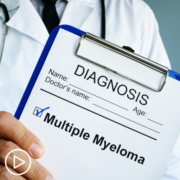Understanding Relapse in Myeloma
Understanding Relapse in Myeloma from Patient Empowerment Network on Vimeo.
What are indicators that a myeloma patient has relapsed? Dr. Mark Schroeder explains how relapsed and refractory myeloma are monitored and treated.
Dr. Mark Schroeder is a hematologist at Siteman Cancer Center of Washington University School of Medicine in St. Louis. Dr. Schroeder serves as Associate Professor in the Department of Medicine. Learn more about Dr. Schroeder.
See More from Engaging in Myeloma Treatment Decisions
Related Resources:

|

|
Transcript:
Katherine Banwell:
What are the indicators that a patient’s disease may have relapsed?
Dr. Mark Schroeder:
Yeah, so we would typically be following a patient about every three months. Somebody that has gone through the initial induction, consolidation, maybe they’re on maintenance therapy, or maybe they’re on active therapy for after they have relapsed from a myeloma.
Each of those visits every three months, we are monitoring bloodwork, we’re monitoring the monoclonal protein that the myeloma produces.
Or if it doesn’t produce much of that protein, we’re monitoring other parameters, so urine testing or maybe even imaging like a PET scan. And we’re looking for consistent rises in that number, and we’re looking for, not necessarily a little rise in the protein, but incremental continuous rise – that suggests that the myeloma is starting to grow again, and it’s growing on the current treatment, and we need to switch gears and try a different treatment. There are some patients who – that protein, the myeloma or the myeloma cancer doesn’t die to treatments – that’s refractory. So, we try a treatment, and there’s just no response. We don’t see a drop in the protein in the blood, we still see a good burden of the myeloma in the bone marrow biopsy. And those patients, that’s also an indication to try a different treatment.
Katherine Banwell:
You mentioned that myeloma often returns, so how typical is it for a patient to relapse?
Dr. Mark Schroeder:
Yeah, I would say that’s the norm for patients with myeloma. There are reports in patients who undergo things like stem cell transplant, that maybe 10 percent of patients might be out 10 years without detection of their myeloma, but that’s not the norm. So, most patients who are diagnosed with myeloma will go through periods of treatment and hopefully periods of remission – the majority go into periods of remission to myeloma where it’s not very active, but the myeloma tends to come back.
Katherine Banwell:
I think you’ve already answered this, but I’m going to ask you in case you give different or more information. If a person is relapsed or refractory, how are they typically treated?
Dr. Mark Schroeder:
So, when they relapse, it depends on their prior treatment. So, if the myeloma is not responding to a drug, then it is, from the physician’s perspective that’s treating you, a good idea to change the type of chemotherapy drug that you’re on. Any time, whether it’s diagnosis or relapse, clinical trials are appropriate to engage with and potentially even use as primary treatment. All clinical studies in myeloma or for cancer in general are typically engineered around active treatments for the cancer. And so, those studies in myeloma when you’re having the cancer relapse, say, early in the course of your cancer, those studies typically are geared to use drugs that are approved by the FDA. Later in the lines of treatment, maybe you’ve had to progress after four lines of treatment, but trying to move them earlier, and they’re very active in the fourth line.
So, you could potentially have access to an active treatment moved earlier in the treatment through a clinical trial. There is also a long list of other approved myeloma therapies. There is a good handout, I think, through the NCCN for patients for myeloma that lists a lot of the approved myeloma therapies and kind of guides patients. It’s a good resource book that I would point any of the listeners to.







